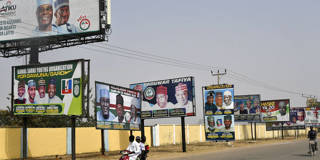Voters in Nigeria will head to the polls this month amid a mounting debt crisis, runaway inflation, worsening insecurity, and extreme poverty. To reverse these trends, Nigeria’s new government must confront entrenched vested interests and embark on long-overdue constitutional and economic reforms.
WASHINGTON, DC – Nigeria’s election on February 25 might be its most critical since independence in 1960. After eight years of turmoil under outgoing President Muhammadu Buhari, the next government has an opportunity to embark on necessary and long-overdue reforms that, if done right, could usher in an era of explosive – and, one hopes, inclusive – economic growth.

WASHINGTON, DC – Nigeria’s election on February 25 might be its most critical since independence in 1960. After eight years of turmoil under outgoing President Muhammadu Buhari, the next government has an opportunity to embark on necessary and long-overdue reforms that, if done right, could usher in an era of explosive – and, one hopes, inclusive – economic growth.